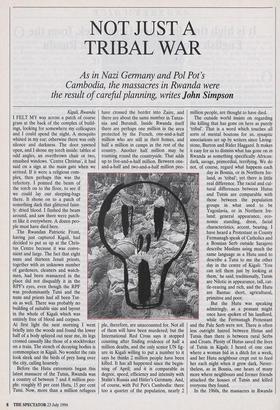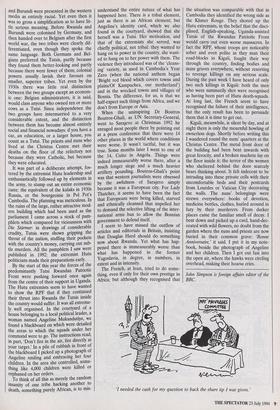NOT JUST A TRIBAL WAR
As in Nazi Germany and Pol Pot's Cambodia, the massacres in Rwanda were
the result of careful planning, writes John Simpson The Rwandan Patriotic Front, having just captured Kigali, had decided to put us up at the Chris- tus Centre because it was conve- nient and large. The fact that eight nuns and thirteen Jesuit priests, together with an unknown number of gardeners, cleaners and watch- men, had been massacred in the place did not disqualify it in the RPF's eyes, even though the RPF was predominantly Tutsi and the nuns and priests had all been Tut- sis as well. There was probably no building of suitable size and layout in the whole of Kigali which was entirely free of blood and corpses. At first light the next morning I went briefly into the woods and found the lower half of a body splayed out near me, its legs crossed casually like those of a stockbroker on a train. The stench of decaying bodies is commonplace in Kigali. No wonder the rats look sleek and the birds of prey hang over the city, calling hoarsely.
Before the Hutu extremists began this latest massacre of the Tutsis, Rwanda was a country of between 7 and 8 minion peo- ple: roughly 85 per cent Hutu, 15 per cent Tutsi. Now, more than a minion refugees have crossed the border into Zaire, and there are about the same number in Tanza- nia and Burundi. Inside Rwanda itself there are perhaps one million in the area protected by the French, one-and-a-half million who are still in their homes, and half a million in camps in the rest of the country. Another half million may be roaming round the countryside. That adds up to five-and-a-half million. Between one- and-a-half and two-and-a-half million peo- pie, therefore, are unaccounted for. Not all of them will have been murdered; but the International Red Cross says it stopped counting after finding evidence of half a million deaths, and the only senior UN fig- ure in Kigali willing to put a number to it says he thinks 2 million people have been killed. It has all happened since the begin- ning of April; and it is comparable in degree, speed, efficiency and intensity with Stalin's Russia and Hitler's Germany. And, of course, with Pol Pot's Cambodia: there too a quarter of the population, nearly 2 million people, are thought to have died.
The outside world insists on regarding the killing that has gone on here as purely 'tribal'. That is a word which touches all sorts of mental boutons for us, synaptic associations set up by writers since Living- stone, Burton and Rider Haggard. It makes it easy for us to dismiss what has gone on in Rwanda as something specifically African: dark, savage, primordial, terrifying. We do not, of course, regard what happens each day in Bosnia, or in Northern Ire- land, as 'tribal'; yet there is little real difference. The racial and cul- tural differences between Hutus and Tutsis are comparable with those between the population groups in what used to be Yugoslavia, or in Northern Ire- land: general appearance, eco- nomic standing, dress, facial characteristics, accent, bearing. I have heard a Protestant in County Fermanagh speak of Catholics and a Bosnian Serb outside Sarajevo describe Muslims using much the same language as a Hutu used to describe a Tutsi to me the other day in the centre of Kigali: 'You can tell them just by looking at them,' he said; traditionally, Tutsis are Nilotic in appearance, tall, cat- tle-rearing and rich, and the Hutu are Bantus: short, agricultural, primitive and poor.
But the Hutu was speaking admiringly, as a peasant might once have spoken of his landlord, while the Fermanagh Protestant and the Pale Serb were not. There is often less outright hatred between Hutus and Tutsis than there is between rural Serbs and Croats. Plenty of Hutus saved the lives of Tutsis in Kigali; I heard of one case where a woman hid in a ditch for a week, and her Hutu neighbour crept out to feed her each night when it grew dark. Never- theless, as in Bosnia, one hears of many more where neighbours and former friends attacked the houses of Tutsis and killed everyone they found.
In the 1960s, the massacres in Rwanda and Burundi were presented in the western media as entirely racial. Yet even then it was so gross a simplification as to have lit- tle serious meaning. Before Rwanda and Burundi were colonised by Germany, and then handed over to Belgium after the first world war, the two tribes were clearly dif- ferentiated, even though they spoke the same language. Both Germans and Bel- gians preferred the Tutsis, partly because they found them better-looking and partly because there were fewer of them; colonial powers usually lavish their favours on smaller, superior tribes. Yet even by the 1930s there was little real distinction between the two groups except an econom- ic one: Belgian administrators, it is said, would class anyone who owned ten or more cows as a Tutsi. Since independence the two groups have intermarried to a very considerable extent, and the distinction between them has become almost entirely social and financial nowadays: if you have a car, an education, or a larger house, you count as a Tutsi. The priests and nuns who lived at the Christus Centre met their deaths on the floor of the refectory not because they were Catholic, but because they were educated.
It was part of a deliberate attempt, fos- tered by the extremist Hutu leadership and enthusiastically followed up by elements in the army, to stamp out an entire economic caste: the equivalent of the kulaks in 1930s Russia, or the bourgeoisie in Pol Pot's Cambodia. The planning was meticulous. In the ruins of the large, rather attractive mod- em building which had been used as the parliament I came across a stock of pam- phlets which compared for viciousness with The Stunner in drawings of considerable crudity, Tutsis were shown gripping the throat of the nation, stuffing their pockets with the country's money, carrying out sub- tle murders. All the pamphlets I saw were published in 1992: the extremist Hutu politicians made their preparations early. By the start of this year the forces of the predominantly Tutsi Rwandan Patriotic Front were pushing forward once again from the centre of their support in Uganda. The Hutu extremists seem to have wanted to show the RPF that if they continued their thrust into Rwanda the Tutsis inside the country would suffer. It was all extreme- ly well organised. In the courtyard of a house belonging to a local political leader, a woman named Angeline Mukandutiye, we found a blackboard on which were detailed the areas to which the squads under her command were to go. The instructions read, in part, 'Don't fire in the air, fire directly at your target.' In a pile of rubbish in front of the blackboard I picked up a photograph of Angeline smiling and embracing her four children. In the area she controlled, some- thing like 4,000 children were killed or orphaned on her orders. To think of all this as merely the random insanity of one tribe hacking another to death, something purely African, is to mis- understand the entire nature of what has happened here. There is a tribal element, just as there is an African element; but Angeline's identity card, which we also found in the courtyard, showed that she herself was a Tutsi. Her motivation, and that of the extremists she served, was chiefly political, not tribal: they wanted to hang on to power in the country, she want- ed to hang on to her power with them. The violence they introduced was of the 'cleans- ing' variety, as used in Cambodia's Year Zero (when the national anthem began 'Bright red blood which covers towns and plains/Of Kampuchea, our motherland') and in the wrecked towns and villages of Bosnia. The difference, for us, is that we half-expect such things from Africa, and we don't from Europe or Asia.
When the uninspiring Dr Boutros Boutros-Ghali, as UN Secretary-General, went to Sarajevo at Christmas 1992 he enraged most people there by pointing out at a press conference that there were 14 other places in the world where conditions were worse. It wasn't tactful, but it was true. Some months later I went to one of the 14, Cuito in Angola. Things were indeed immeasurably worse there, after a much longer siege and a much heavier artillery pounding. Boutros-Ghali's point was that western journalists were obsessed by the awfulness of Sarajevo simply because it was a European city. For Lady Thatcher, it seems to have been the fact that Europeans were being killed, starved and ethnically cleansed that impelled her to demand the selective lifting of the inter- national arms ban to allow the Bosnian government to defend itself. I seem to have missed the outflow of articles and editorials in Britain, insisting that Douglas Hurd should do something now about Rwanda. Yet what has hap- pened there is immeasurably worse than what has happened in the former Yugoslavia, in degree, in numbers, in extent and in intensity.
The French, at least, tried to do some thing, even if only for their own prestige in Africa; but although they recognised that the situation was comparable with that in Cambodia they identified the wrong side as the Khmer Rouge. They shored up the Hutu extremists, in the belief that the disci- plined, English-speaking, Uganda-assisted Tutsis of the Rwandan Patriotic Front would carry out even worse massacres. In fact the RPF, whose troops are noticeably sober and even polite as they man their road-blocks in Kigali, fought their way through the country, finding bodies and mass graves everywhere, without resorting to revenge killings on any serious scale. During the past week I have heard of only two such killings in Kigali: both the men who were summarily shot were recognised as having been part of Hutu death-squads. At long last, the French seem to have recognised the failure of their intelligence, but the only result has been to persuade them that it is time to get out.
Kigali, meanwhile, is silent by day, and at night there is only the mournful howling of ownerless dogs. Shortly before writing this I wandered round the nuns' quarters at the Christus Centre. The metal front door of the building had been bent inwards with great ferocity, and a broken machete lay on the floor inside it; the terror of the women who sheltered behind the door scarcely bears thinking about. It felt indecent to be intruding into these private cells with their uncomfortable beds and their postcards from Lourdes or Vatican City decorating the walls. The nuns' belongings were strewn everywhere: books of devotion, medicine bottles, clothes, hurled around in fury by their murderers. From darker places came the familiar smell of decay. I bent down and picked up a card, hand-dec- orated with wild flowers, no doubt from the garden where the nuns and priests are now buried in their common grave: 'Bonne Anniversaire,' it said. I put it in my note- book, beside the photograph of Angeline and her children. Then I got out fast into the open air, where the hawks were circling overhead, making their hoarse cries.
John Simpson is foreign affairs editor of the BBC.
'I needed the cash for my question to back the share tip I was given.'



















































 Previous page
Previous page